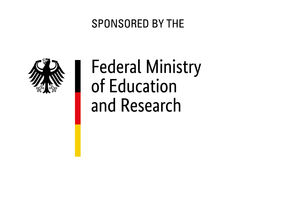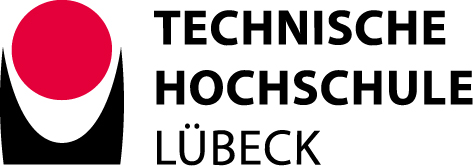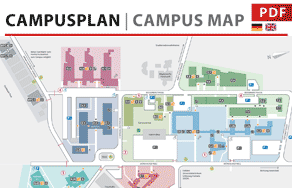- Overview
The International Office awards mobility grants within the framework of Erasmus+ for study stays at our partner universities and internships in Europe. Through the DAAD's PROMOS program, travel grants are awarded to students of Lübeck University of Technology. The student association IAESTE arranges paid internships worldwide. In addition, you can apply for university-owned programs.
Furthermore, there are numerous scholarship programs offered by the DAAD, various foundations and organizations. We have compiled an overview of the most important funding opportunities for you below.
Funding opportunities at the TH Lübeck
You can take advantage of the following funding opportunities through the Lübeck University of Technology:
- Participation in the Erasmus+ program of the European Union
- Travel grants within the framework of the PROMOS program
- Shanghai scholarship (China)
- Paid internships abroad through IAESTE LC Lübeck
- MSOE Double Degree Program (USA)
- Tuition fee waiver within international partnerships
Subject- and country-specific funding opportunities
Depending on the subject and country, additional funding opportunities are available:
- Scholarship database of the DAAD
- Foundation index of the Association of German Foundations
- Scholarship platform mystipendium.de
- Fulbright Commission for stays in the USA
DAAD: HAW.International
The DAAD supports students at universities of applied sciences during their stays abroad with the HAW.International program. Students in Bachelor's and Master's programs receive scholarships for a stay abroad as part of their studies, internship or thesis. The duration of the grant varies according to the type of stay. The scholarship includes the following benefits:
- a monthly scholarship installment, which is determined according to the host country,
- a travel allowance, the amount of which varies according to the host country,
- health, accident and personal liability insurance benefits,
- for study visits: Subsidy for tuition fees, if any, up to an upper limit (depending on the destination country),
- for theses: Subsidy for travel in the host country directly related to the project.
In addition, family benefits for accompanying spouses or partners and children can be granted upon application under certain conditions. Simultaneous funding via Erasmus+ or PROMOS and HAW.International is excluded.
Further information on the program is available online: HAW.International: Semester Stays and Theses and HAW.International: Internships Abroad
International BAföG
For study and internship stays, benefits can be applied for according to the BAföG-Auslandszuschlagsverordnung:
- Monthly foreign supplement for education outside the EU/Switzerland.
- Verifiable tuition fees (up to 4,600 euros per academic year)
- Subsidy for travel expenses
- Subsidy for health insurance.
The payments according to the BAföG-Auslandszuschlagsverordnung are in principle made as a grant (repayment-free) and as an additional semester to the domestic BAföG.
Note: The subsidy rates for BAföG abroad may mean that someone who is not eligible in Germany due to the level of their parents' income can still receive a subsidy. Therefore, we generally recommend that you submit an application and obtain information.
Important: Applications for funding abroad should be submitted at least six months before the start of the planned stay abroad.
Education loan
Another way to secure funding for a stay abroad is through education and student loans. These mostly low-interest loans offer targeted financial support and can often be flexibly adjusted.
In contrast to BAföG, the federal government's education loan program is independent of the student's own income and assets as well as those of his or her parents or spouse or partner, and can also be obtained in addition to BAföG.
- ERASMUS+
Erasmus+ Funding covers the following benefits:
- Academic recognition of study achievements abroad,
- Tuition waiver at the Erasmus partner university (mobility for studies) or
- EU Traineeship agreement signed by TH Lübeck, the receiving organization and the student (mobility for traineeship),
- Organizational and administrative support before, during and after the mobility,
- Language support through online courses and placement tests,
- Financial Top-Ups for students with disabilities (Grad der Behinderung ab 20), students with a chronic illness, students with child(ren), first generation students and working student (see details below) and
- Individual support grant as a contribution to the additional costs for travel and subsistence related to the period of study or traineeship abroad.
The monthly amount of the individual support grant is based on the country of destination. The program countries are divided into the three following groups according to their living costs:
Mobility for studies
Group 1: Austria, Belgium, Denmark, Finland, France, Ireland, Iceland, Italy, Liechtenstein, Luxembourg, Netherlands, Norway, Sweden - 600 €
Group 2: Cyprus, Czech Republic, Estonia, Greece, Latvia, Malta, Portugal, Slovakia, Slowenia, Spain - 540 €
Group 3: Bulgaria, Croatia, Hungary, Lithuania, North Macedonia, Poland, Romania, Serbia, Turkey - 540 €Mobility for traineeship
Group 1: 750 €
Group 2: 690 €
Group 3: 690 €The traineeship can last from 2 to 12 months.The funding period is limited to 5 months but can be extended under certain conditions.
Travel support
With the Erasmus+ project 2025, students receive a travel allowance according to the distance from Lübeck to the receiving organisation calculated with the Erasmus+ distance calculator.
Travel distance Green travel support Regular travel support 10 - 99 km 56 Euro 28 Euro 100 - 499 km 285 Euro 211 Euro 500 - 1999 km 417 Euro 309 Euro 2000 - 2999 km 535 Euro 395 Euro 3000 - 3999 km 785 Euro 580 Euro 4000 - 7999 km 1188 Euro 1188 Euro 8000 km and more 1735 Euro 1735 Euro Financial Top-ups
Erasmus+ participants can receive one of the following financial top-ups when meeting the criteria. Participants receive the top-up amount to the individual support of the EU Erasmus+ grant. Participants eligible for a social top-up are also entitled to receive the top-up amount for internships and the top-up amount for Green Travel. If a participant meets the criteria for more than one social top-up (e.g. first generation student and working student), only one social top-up can be granted. Participants with a disability, a chronic illness or accompanying children can apply for a monthly top-up or a contribution based on real costs. The application for a contribution on real costs has to be submitted to the DAAD at least 3 months before the start of the mobility period. To receive the financial top-up, participants have to sign a Declaration of Honour and submit the supporting documents to the International Office.
1. Top-up for Green Travel
Participants can opt for a green travel top-up when they will travel to their partner university using a sustainable mode of transportation. The DAAD classifies the train, carpooling, the bus, cycling and walking as sustainable transportation methods. Participants are asked to use green travel methods for at least 50% of the travel distance. Eligible participants receive the higher travel support and up to 6 days of additional funding to cover travel days for a return trip, if relevant. To receive the top-up: Save all tickets/ proof of travel for at least 5 years. For travels with non sustainable mode of transportation, students can apply for max 2 travel days if applicable.
2. Social top-up for first generation students
Participants whose parents have not acquired an academic degree at a university or a university of applied sciences are eligible for this top-up. A degree from a university of cooperative education (Berufsakademie) leading to a qualification comparable to a university degree is to be treated as an academic degree. A master craftsman's diploma (Meisterbrief) is not to be equated with an academic degree in this context. University courses completed abroad that are not recognized as such in Germany (e.g. physiotherapy) are considered as an academic degree in this context. For participants with a single parent, this regulation only applies to the single parent. Eligible participants will receive a top-up amount to the Erasmus+ grant with an amount of 250 EUR per month. To receive the top-up: Submit a declaration signed by your parents that they have not acquired an academic degree.
3. Social top-up for working students
Participants who have been employed for at least 6 months before the start of their studies abroad and who are unable to continue their employment during their stay abroad are entitled to apply for this top-up. The employment must have been subject to social insurance contributions and the monthly net income must be between 450 and 850 Euro (sum of all monthly incoming). Students who are self-employed and/or studying in a dual/part-time programme are not eligible. Eligible participants will receive a top-up amount to the Erasmus+ grant with an amount of 250 EUR per month. To receive the top-up: Submit a proof of employment, e.g. employment contract, payslips, employer's certificate.
4. Social top-up for students with accompanying child(ren)
Participants who will be accompanied by their child/children can apply. This also applies to couples. However, double funding of a child is excluded. Eligible participants will receive a top-up amount to the Erasmus+ grant with an amount of 250 EUR per month. To receive the top-up: Submit a proof of parenthood (e.g. birth certificate, parental allowances) and travel documents for the child(ren)
5. Social Top-Up for students with a disability or a chronic illness that will cause extra costs
Participants with a min Grad der Behinderung (GdB) of 20 or a chronic illness that will cause extra costs while studying abroad can apply. Eligible participants will receive a top-up amount to the Erasmus+ grant with an amount of 250 EUR per month. To receive the top-up: Submit a proof of disability (Behindertenausweis) or a medical statement confirming that there is an additional financial need abroad due to the chronic illness.
Participants with special needs can obtain information on the support measures provided by the universities on the website inclusivemobility.eu.
For further information on the financial top-ups, please refer to the website of the DAAD.
Participation requirements
An existing inter-insitutional agreement between TH Lübeck and the host university is a prerequisite for an Erasmus+ student mobility for studies. Both universities must be a holder of a valid Erasmus Charter for Higher Education (ECHE). In case of student mobility for traineeships, an EU traineeship agreement has to be signed by TH Lübeck, the host institution and the student. EU institutions and other EU bodies including specialised agencies are not eligible as receiving organisations for student mobility for traineeships.
Eligable are all students enrolled at TH Lübeck in studies leading to a recognised degree. Student mobility for studies is possible from the 3rd semester on. Traineeships abroad can be started in the first year of studies and even after graduation. Recent graduates must be selected by TH Lübeck during their last year of study, and must carry out and
complete their traineeship abroad within one year of obtaining their graduation.Duration of the activity:
- Student mobilty for studies: 2 to 12 months
- Student mobility for traineeship: 2 to 12 months
- The same student may participate in mobility periods totalling up to 12 months of physical mobility maximum per each cycle of study, independently of the number and type of mobility activities.
After an Erasmus+ funded stay abroad, the grant holder are requested to submit a final report which will be made available for other students in the Lernraum.
Application
To apply for an Erasmus+ funded student mobility, the student has to take these 3 steps:
Student Mobility for Studies
1. Select a partner university
2. Apply for an exchange place with the International Office, Deadline: 15 January and 1 September
Important: Late application can be accepted as long as funds are available and the deadlines at the respective partner university can still be met. Further information is available in the Lernraum.
Supporting documents:
- Application form
- Letter of Motivation
- Transcript of Records
- Enrollment certificate
- Declaration of Honour for Social and/ or Green Travel Top-Up, if applicable
3. Selection and Nomination
The International Office ranks all received applications according to the following selection criteria: Academic performance, motivation and language skills. The departments will be consulted if necessary. According to the ranking list, the students are selected for the available exchange places at the partner universites. The International Office informs the student about the decision and nominates the student at the partner university. The selection for placement at the partner university includes the selection for the Erasmus+ individual support grant.
4. Application at the partner university
After the nomination, the student has to submit the application documents at the partner university. Information is available from the partner university and the International Office.
Student Mobility for Traineeship
1. Apply for a Traineeship
2. Apply for Erasmus+ funding at the International Office, Deadline: 1 month before the start of the traineeship
Supporting documents:
- Application form
- Letter of Motivation
- Transcript of Records
- Enrollment certificate
- Declaration of Honour for Social and/ or Green Travel Top-Up, if applicable
- Proof of sufficient health, liability and accident insurance
- Learning Agreement signed by the student, receiving organization and responsible person at TH Lübeck
3. Selection
The International Office processes the application and grants the Erasmus+ individual support taking into account the available funds.
A list of former receiving organisations and reports by TH Lübeck students are available in the Lernraum.

- PROMOS
The PROMOS program supports financially short-term mobilities outside the Erasmus+ program from 6 weeks to a maximum of 6 months. A one-off travel allowance is granted. The amount depends on the destination.
Application
The application for a PROMOS-scholarship has to be submitted to the International Office before 15 February.
Supporting documents:- Application form
- Letter of Motivation
- Transcript of Records
- Enrollment certificate
- Letter of confirmation/ Internship agreement issued by the receiving organization (can be submitted later).
The International Office ranks all received applications according to the following selection criteria: Academic performance, motivation and language skills. The departments will be consulted if necessary. Mobilities to the TH Lübeck's partner universities have priority. According to the ranking list, the International Office informs the students about the funding selection.
Application submitted after 15 February can be considered for funding in case there are still financial funds available.

- Shanghai-Stipend
The Shanghai Scholarship Program offers the following benefits:
- A 3- or 6-month study period at the East China University of Science and Technology (ECUST), a partner university of THL since 1989.
- Supervised project work or enrollment in English-language courses.
- The tuition fees in China are covered.
- Accommodation in international dormitory (single room with bathroom and internet access).
- Monthly stipend of 1000 Yuan.
- Support from the International Office and local student buddies.
Please note that visa, flight and insurance costs are the responsibility of the student. We recommend that you apply for a PROMOS scholarship to cover your travel costs.
Notice: Please contact the program director of your department at Technische Hochschule Lübeck in advance to ensure that the project work you plan to do at ECUST will be recognized as part of your studies. If you wish to have your ECUST English-language courses recognized by THL, please also consult the head of your degree program.
Participation Requirements
To qualify for the Shanghai Scholarship, you must already be enrolled at Technische Hochschule Lübeck (THL) in one of the following departments:
- Applied Natural Sciences
- Electrical Engineering and Computer Science
- Mechanical Engineering and Business Administration
We recommend that you participate in the Chinabuddy program for at least one semester prior to applying in order to gain experience in dealing with Chinese culture and lifestyle.
Application
Please submit a complete application to the Vice President for Research and International Affairs, Prof. Caren Cabos that includes the following documents:xyyyy<<<fdddffffffffffffffgm,m ,. zu v u89
- Completed Scholarship Application Form (PDF)
- Comprehensive letter of application, including your academic focus and desired ECUST department
- Curriculum Vitae (CV)
- Current academic transcript
- Proof of English proficiency (e.g. school certificate)
- Letter of recommendation from a professor at TH Lübeck
- Other relevant certificates
Note: A personal appointment with the China Coordination is necessary for the selection of ECUST departments and academic majors, as not all information is available in English on the ECUST website.
Please clarify in advance with the head of your study program or departmental coordinator whether your planned study/ research project at ECUST can be recognized as part of your studies at TH Lübeck.
Application materials must be submitted to the China Coordination in digital form as a single PDF document in English.
The final selection of scholarship recipients is at the discretion of ECUST, with a pre-selection made by TH Lübeck. In addition to the academic performance, the personal suitability of the applicants will also be taken into consideration.
- Zhejiang-Stipend
- IASTE
The International Association for the Exchange of Students for Technical Experience (IAESTE) is an association of national committees representing academic, industrial and student interests. It serves 3500+ students, 3000 employers and 1000 academic institutions through career-focused professional traineeships abroad, social and intercultural reception programmes, international networking and other career and employer branding activities in more than 80 countries worldwide.
Internships are tailored to students in STEM fields (engineering, science, maths, IT etc.) but if the student's field of study is not one of those the student can still apply, as long as the internship requirements are met.
General process to apply for an IAESTE internship
- Find a internship: https://iaeste.org/internships
- Get in contact with local Lübeck IAESTE committee (by Mail, Facebook or Instagram).
- Be accepted by the employer
- Start your internship
All IAESTE on-site internships are paid a cost of living allowance which as a minimum will cover accommodation, foods and local travel. Some remote internships may offer alternative arrangements and these will be stated in the internship information. For internships outside the EU, the student can apply for a travel allowance with the DAAD.
Applications have to be submitted to the local IAESTE committee between October and January. Detailed information on the application process and the required documents are available online and with the local IAESTE committee.



